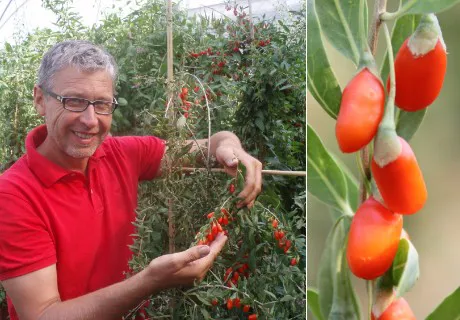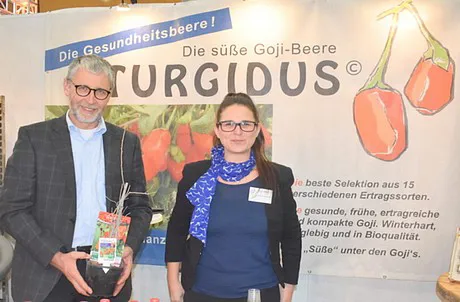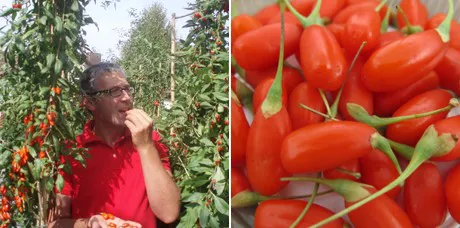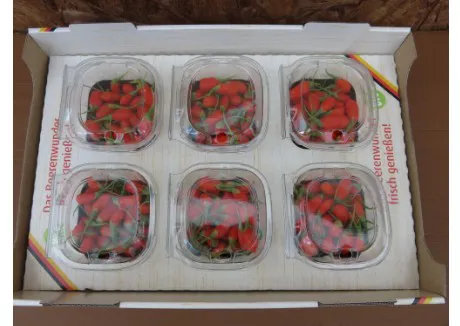Gojis are still little known on the market in Central Europe, and when they are, it is in their dried form. A producer from Baden-Württemberg wants to change that: "Gojis for all" is the motto of Klaus Umbach of Bioland nursery Umbach in Heilbronn. 
"We've been making goji berries here for eight years and can say with complete conviction that my gojis are the sweetest and the earliest. There are hundreds of different varieties, of which we have tried 15, discarding all but one." The seedlings that brought the breakthrough came directly from China: "We sampled plants from all over Europe, and finally we were able to import seedlings from China, quarantined and all the trimmings, but it was worth it. The Turgidus is by far the best strain." 
Klaus Umbach and Katrin Lewandowski at their booth at last year's ExpoSE in Karlsruhe.
Pioneer in all things Goji
The goji cultivation came in search of alternatives to psychotropic drugs for his daughter. "At some point, after many years, we came across Chinese medicine and goji berries; the berry has been used for the cure of various diseases for 2000 years, but this has not yet arrived in western thinking."
Organic cultivation was a natural step for Umbach: "I ran conventional agriculture for 30 years and then switched to organic with the gojis - if I was going for these medicinal plants, I wanted to do it right. That made me the first person to do so here in Germany and I had to figure out everything on my own."
"I want Gojis for everyone"
The development of this enterprise goes back to a call by Edeka for more innovation by growers. "A colleague from the area grows the plants I supply to him on three hectares, and the berries are Bioland and Demeter certified. They are then dried or freshly prepared for marketing at Edeka." The retail giant wants to be a pioneer in the marketing of sweet, German organic gojis, says Umbach.

"I'm a very small operation compared to other companies that are interested in growing, and I've already delivered my variety to a lot of different locations: from Sweden to Morocco. It grows everywhere. The variety itself is not my property and there are some imitators," but he is not bothered, says Umbach. "I have a missionary urge: I want gojis for all, and to achieve that, I will offer my seedlings and cultivation know-how."
Goji berries for fresh consumption
But now the berry has to be brought closer to the consumer: "As a first step, we now want to bring the berry to the market, because many consumers do not know that there are goji berries for fresh consumption from the region." Although the dried counterpart has a certain degree of familiarity, it is imported from afar and the guidelines, for example regarding heavy metals or fertilizers, are much less stringent than those of the organic berries from Baden-Württemberg.
In recent years, there have been a number of factors that have had a negative effect on the reputation of the Gojis in the German market: "The heavy metal contamination was definitely a disadvantage, but the taste often left a lot to be desired. When a consumer ever dares to taste something new and the fruit tastes bitter, he or she will not buy it a second time."

Enlightenment work available
The harvest in Germany and Europe started this week - but because of the size and sensitivity of the berry, it is very labor intensive. "Of course, Morocco has an advantage in terms of labor costs, but it lacks in taste." To cover our costs, we would have to sell 30 grams of gojis for a good € 5.00. " The harvest started late this year according to the expert; usually the season is from mid-June to mid-October.
In the medium term, it is up to the entrepreneur to provide information. "Clear information on the effect of the berry and the differences in the varieties are very important to me and are crucial for the success of superfruit in the German market."
For more information:
Klaus Umbach
Gärtnerei Umbach
Klinge 2 / Staufenberger Weg
74074 Heilbronn
Tel: 07131 58960-0
Tel: 07131 58960-14
E-Mal: info@gaertnerei-umbach.de
Web: www.gaertnerei-umbach.de/
